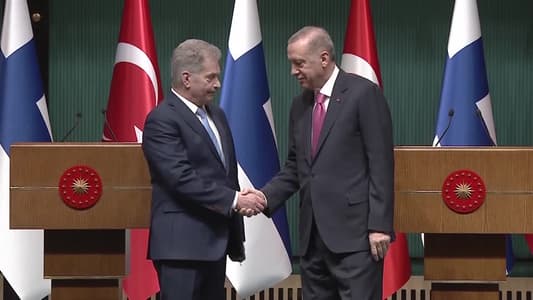President Tayyip Erdogan said on Friday Turkey's parliament will start ratifying Finland's accession to NATO, lifting the biggest remaining hurdle to enlarging the Western defence alliance as war rages in Ukraine, though he held off approving Sweden's bid.
Speaking in Ankara alongside Finnish counterpart Sauli Niinisto, Erdogan said Helsinki had won Turkey's blessing after taking concrete steps to keep its promises to crack down on what Ankara sees as terrorists and to free up defence exports.
The three countries signed a deal in Madrid last year laying out steps to overcome Turkey's concerns over accession, but Ankara has said Sweden has not gone far enough.
Erdogan spoke by phone with NATO Secretary General Jens Stoltenberg and said Turkey was determined to continue talks with Sweden, with progress directly related to the concrete steps that it takes, the Turkish presidency said.
The parliaments of all 30 NATO members must ratify newcomers. Finland would represent the first enlargement since North Macedonia joined the trans-Atlantic pact in 2020.
"We have decided to initiate the ratification of Finland's accession process to NATO in our parliament," Erdogan told reporters after meeting with Niinisto, adding he hoped parliament would endorse the bid before May 14 elections.
Niinisto said he welcomed the decision and called it "very important" for Finland, which shares a long and remote border with Russia. He added it was important that neighbour Sweden also joined the alliance.
Swedish Foreign Minister Tobias Billstrom said Sweden still hoped to be accepted into NATO by the time of the alliance's meeting in Vilnius in July.
"Our partners support us, both in making sure that we can become members of NATO as soon as possible, and in ensuring our security until such time as we become a full member," he said.
"It is a question of when Sweden becomes a member, not if."
In response to Russia's invasion of Ukraine, Sweden and Finland applied last year to join NATO but faced unexpected objections from Turkey, which joined in 1952.
Ankara says Stockholm harbours members of what Turkey calls terrorist groups, particularly the Kurdish militant group PKK, a charge Sweden denies.
Turkey wants Sweden to extradite a number of individuals who it says are terrorists, but some of those applications have been rejected.
Billstrom said cases were decided by the courts. "There are going to be decisions that can be positive, but can also be negative from Turkey's point of view, and that's just how it is," he said.
Apart from Hungary, whose ruling party has said it backs the two Nordic bids but has delayed formal steps to approve them, Turkey is the only NATO member not yet to have given Finland and Sweden its green light.
Ankara suspended talks in January after a far-right politician burned a copy of the Muslim holy book, the Koran, in Stockholm, but lower-level talks resumed in Brussels last week.
Amid simmering tensions with Sweden, Erdogan signalled in January that Turkey could endorse Helsinki ahead of Stockholm. Washington and other NATO members had hoped the two Nordic countries would join the alliance at a NATO summit set for July 11 in Vilnius.
Erdogan's blessing for Finnish membership comes nearly a year after he shocked members with a threat to veto the bids, and two months before elections that are seen as the most consequential vote in Turkey's history.
Turkey's parliament is expected to ratify Finland before it closes in mid-April ahead of the parliamentary and presidential votes scheduled for May 14.
The expected approval of one of the two Nordic bidders could be welcomed by Western diplomats and investors.
"Investors would like to see a Turkish pivot back towards closer relations with its traditional Western allies," said Blaise Antin, head of EM sovereign research at asset manager TCW in Los Angeles.
"Headlines about vetoing NATO enlargement or helping Russia evade sanctions are unnerving to Turkey's traditional economic and investment partners in the United States and Europe," he said.










TWEET YOUR COMMENT